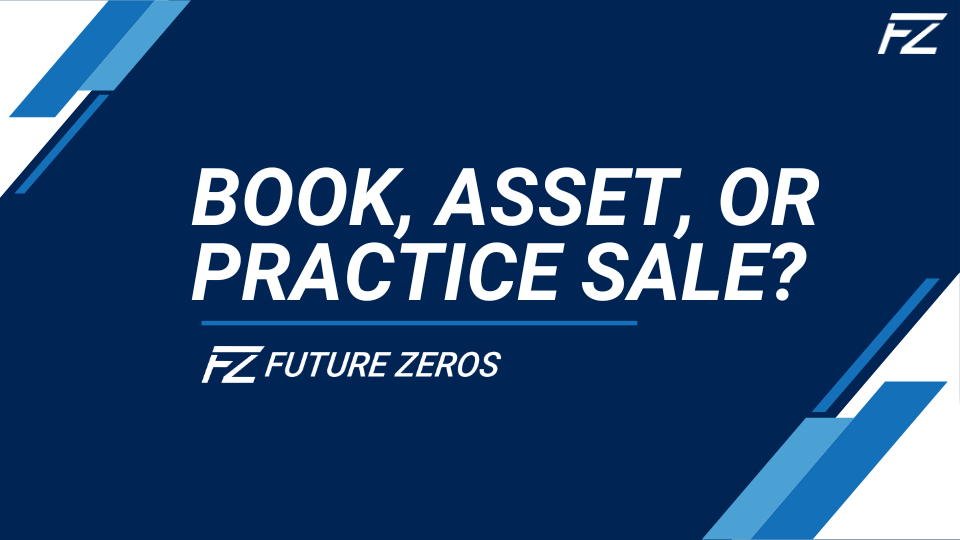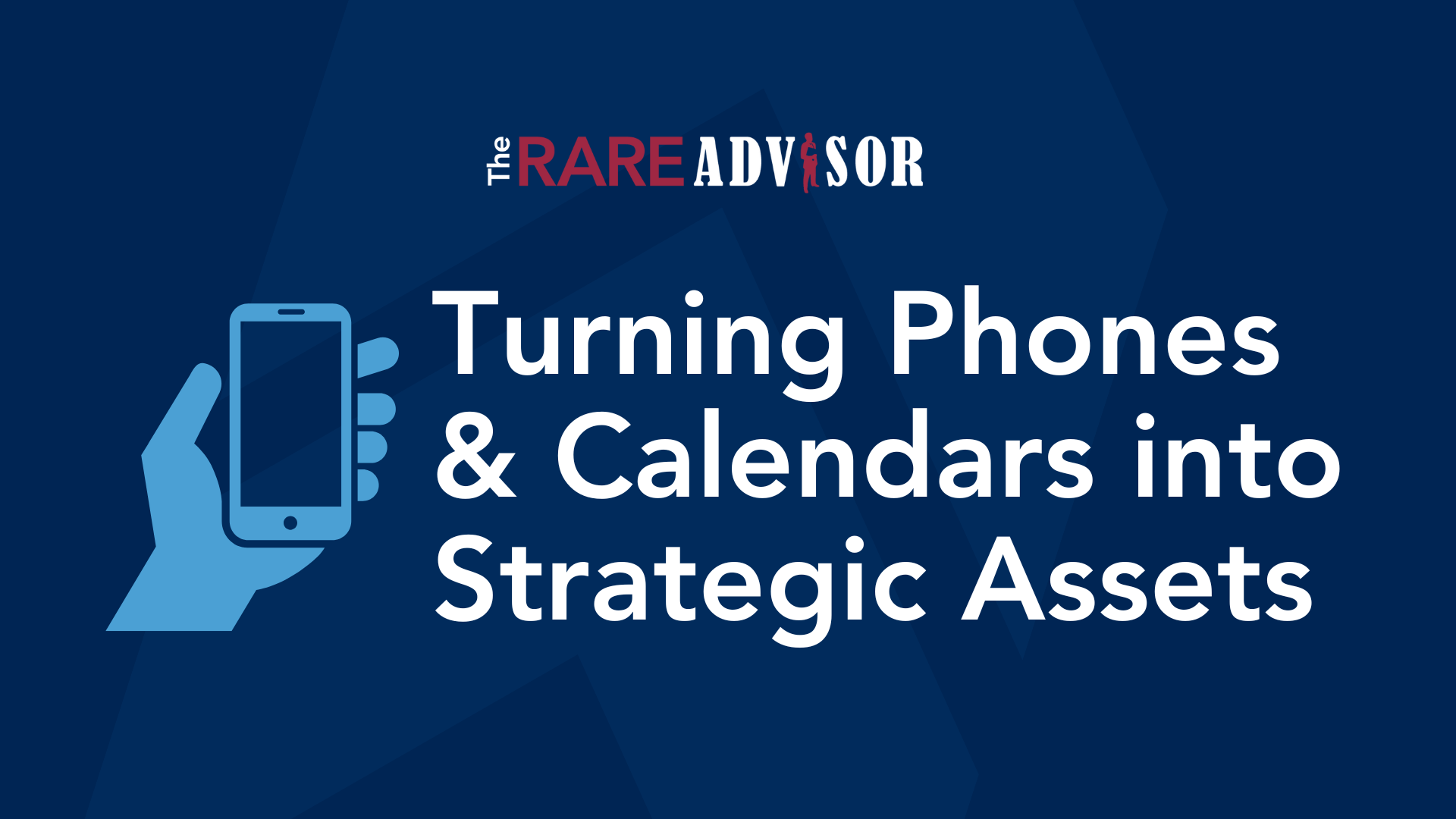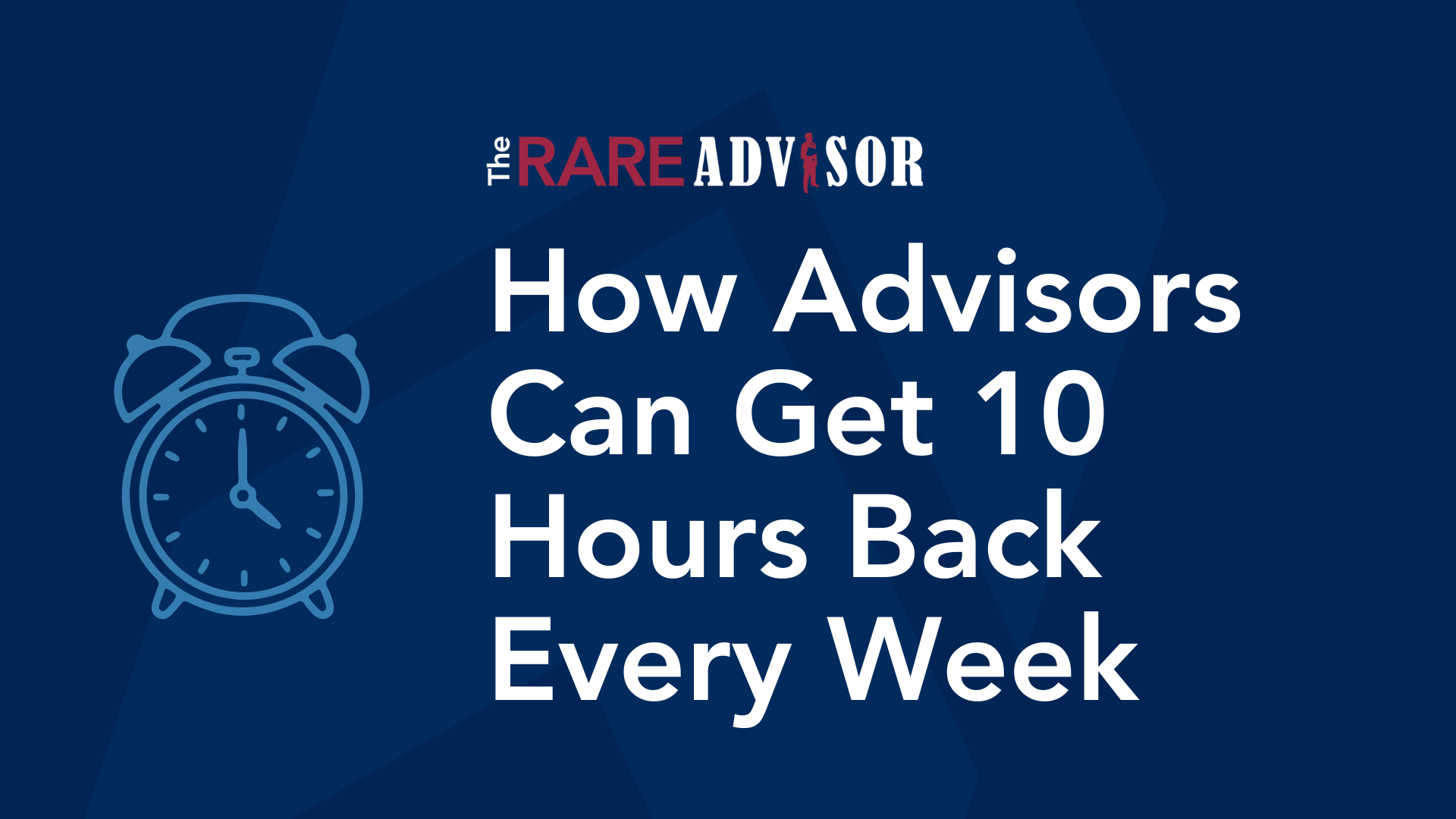Book, Asset, or Practice Sale?

What is the difference between selling/buying a book of business, selling/buying a financial practice, and selling/buying the assets of a business? If you don’t know the difference between these before walking into an M+A negotiation, you’re at a huge disadvantage. In this episode of Future Zeros, we’ll dive into each option and when it may be a good fit for you.
When you're buying or selling a financial advisory practice how do you know if you should be talking about buying or selling the book, buying or selling the assets, or buying or selling the practice? They're actually three very different things, and depending on what you're trying to accomplish, you want one over the other.
If I'm running a viable financial advisory practice and I'm trying to buy the advisor on the other side of town, and I really don't need anything other than the block of business, then I'm trying to buy the book. That's all I want. I probably don't want all that extra overhead. I might not even need the other office site or location, and so on. But I'm going to merge it into mine. I'm not going to run it as a separately branded practice. So I probably want to buy the book.
Then, on the other hand, maybe I want to buy the assets. So not just the book, but I want to buy the assets. Well, what does that mean? Well, maybe it means that I want some of the stuff they have, besides just the book or the block of business, but I don't want all of it. Maybe I want to retain a couple of key service employees. Maybe I am actually interested in the location, but I don't want their equipment, because I'm going to meld them into my phone system, into my network system, the CRM and other technology components, and everything else that goes along with that. Maybe I'm going to piggyback all of that, but I don't really want to buy the entire practice. I just want some sub-pieces of it. So I want to buy those assets, which is bigger than buying the book, but still not buying the whole practice.
Maybe I'm going to buy the entire practice, meaning the ongoing value of it as a business. I'm going to keep its branding. I'm going to continue to push it into the marketplace. I'm going to have someone operating that, whether it's me or some other person I hire as an operator.
Or, let's flip that around, let's say I'm going to sell - what can I get the most money for? Can I get the most money for selling my book of business, for selling my book with the assets of the business, or for selling the entire business? Well, you probably know the answer to that. It's for selling the entire practice. But as I discussed in a previous video, if you're trying to get multiple bites of the apple, you can only do that by selling the practice. You can't do it by selling the book. You sell the book, you might get paid over a period of time, but it's a stream of payments based on that book. Trying to get multiple bites of an apple is saying 'I'm still going to grow this business, I'm still going to operate this business, I'm going to bring on an outside, significant investor, and I will then sell the rest of the business to that investor down the road, once I grow it even further and create even more value'.
So the idea of selling a book vs. an asset vs. the practice is very distinct and different, yet hardly anybody talks about this. When somebody is telling you they sold their business in the financial advisory space, 9 times out of 10 they mean they sold their book. But if they work themselves over to the other side of the equation, they could actually make a lot more money. But you have to understand how to do it. The other thing that will happen is the business will get valued a little differently. With a book sale it's getting valued basically on a revenue multiple. With a practice sale it's getting valued on an EBITDA multiple. So it's very different depending on what type of structure you're buying or selling - a book, the assets, or the practice. We're going to dive even deeper as we continue to discuss these things.
--
Future Zeros is a series for financial advisors who want to increase the value of their firm today and in the future. Your host, Mike Walters (CEO of USA Financial), digs into the nuances of mergers, acquisitions, and succession within the financial advice industry to help you add “future zeros” to your bottom line. Whether you are nearing an exit, just entering the business, or in the middle of building your practice, the Future Zeros series will provide thoughtful insights into how to grow your practice the right way in order to maximize your future value and minimize the risk associated with doing so.
Author Info

Mike Walters is the Chief Executive Officer (CEO) of USA Financial, leading the firm since its inception in 1988. Mike is committed to...
Related Posts

Access by Design: Turning Phones and Calendars into Strategic Assets
In this episode of The RARE Advisor, host Aaron Grady and practice management consultant Allan Oehrlein continue their discussion on time allocation by exploring what comes next: operationalizing structure across the entire advisory team. They break down why the phone is the “front door” to the firm and the calendar is the “engine room,” and how elite practices use standardized phone scripts, the strategic power of the word “unavailable,” intentional scheduling rules, and team empowerment to build consistency, capacity, and trust. Aaron and Allan outline how designed access—not unlimited access—creates scalability and a stronger client experience, while reducing reactivity, burnout, and advisor bottlenecks. They also offer practical challenges advisors can implement immediately to redesign their phone and scheduling processes in ways that elevate both team culture and enterprise value.

The Psychology Behind Your CTA: Why Prospects Don’t Click “Book a Call”
In this episode of Financial Advisor Marketing Playbook, Mark Mersman breaks down the real psychological barriers that stop prospects from clicking “book a call” on an advisor’s website—and how small language and design changes can dramatically improve conversions. You’ll learn practical, compliant fixes including softer CTA language, expectation statements, empathy‑based messaging, simplified design, and reassurance techniques that lower emotional friction. If you want a website that encourages prospects to take the first step confidently, this episode delivers actionable guidance advisors can implement immediately.

How Advisors Can Get 10 Hours Back Every Week
In this episode of The RARE Advisor, host Aaron Grady and USA Financial Pareto coach and Practice Management Consultant Allan Oehrlein dive into time allocation as a core lever for advisory success. They unpack the biggest time drains—email, unsolicited calls, and open-door interruptions—and lay out a practical framework for calendar rebalancing that starts with personal time, management time, client appointments, dedicated communications windows, “work on the business” time, and high-impact growth activities. With real-world stories showing how advisors shift from reactive days to structured weeks (and even reclaim Fridays), Aaron and Allan share easy-to-implement tips: color coding calendars, scheduling buffers, daily huddles, and call/appointment protocols. If you’re ready to audit your calendar, define your ideal week, and create structure that truly liberates your practice, this conversation is your next step.

Access by Design: Turning Phones and Calendars into Strategic Assets
In this episode of The RARE Advisor, host Aaron Grady and practice management consultant Allan Oehrlein continue their discussion on time allocation by exploring what comes next: operationalizing structure across the entire advisory team. They break down why the phone is the “front door” to the firm and the calendar is the “engine room,” and how elite practices use standardized phone scripts, the strategic power of the word “unavailable,” intentional scheduling rules, and team empowerment to build consistency, capacity, and trust. Aaron and Allan outline how designed access—not unlimited access—creates scalability and a stronger client experience, while reducing reactivity, burnout, and advisor bottlenecks. They also offer practical challenges advisors can implement immediately to redesign their phone and scheduling processes in ways that elevate both team culture and enterprise value.

The Psychology Behind Your CTA: Why Prospects Don’t Click “Book a Call”
In this episode of Financial Advisor Marketing Playbook, Mark Mersman breaks down the real psychological barriers that stop prospects from clicking “book a call” on an advisor’s website—and how small language and design changes can dramatically improve conversions. You’ll learn practical, compliant fixes including softer CTA language, expectation statements, empathy‑based messaging, simplified design, and reassurance techniques that lower emotional friction. If you want a website that encourages prospects to take the first step confidently, this episode delivers actionable guidance advisors can implement immediately.

How Advisors Can Get 10 Hours Back Every Week
In this episode of The RARE Advisor, host Aaron Grady and USA Financial Pareto coach and Practice Management Consultant Allan Oehrlein dive into time allocation as a core lever for advisory success. They unpack the biggest time drains—email, unsolicited calls, and open-door interruptions—and lay out a practical framework for calendar rebalancing that starts with personal time, management time, client appointments, dedicated communications windows, “work on the business” time, and high-impact growth activities. With real-world stories showing how advisors shift from reactive days to structured weeks (and even reclaim Fridays), Aaron and Allan share easy-to-implement tips: color coding calendars, scheduling buffers, daily huddles, and call/appointment protocols. If you’re ready to audit your calendar, define your ideal week, and create structure that truly liberates your practice, this conversation is your next step.

